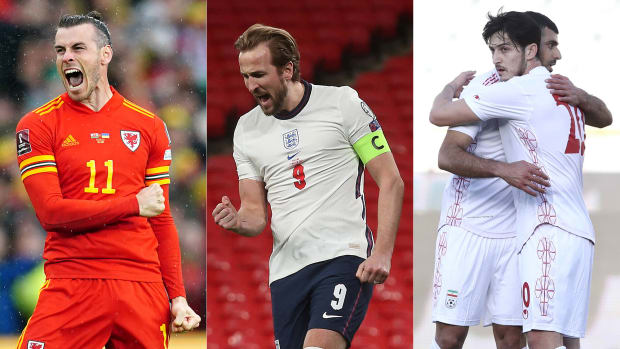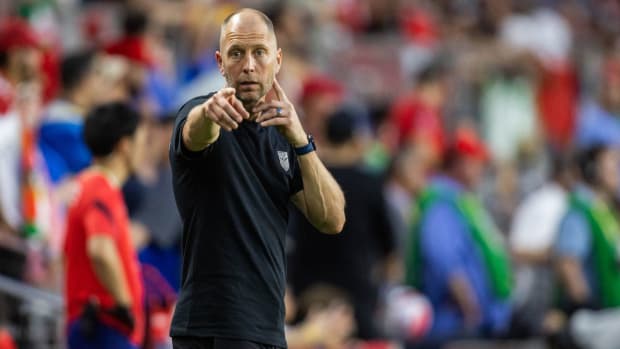Wales, England and Iran are the three opponents, and while it seems manageable on paper, it also arguably makes for the most difficult quartet in the competition.
Suffice to say, the group stage that the U.S. men’s national team is about to open up is hardly a tune-up for what’s to come in November. The Concacaf Nations League, where the U.S. will play the world’s 170th-ranked team (Grenada) and 74th (El Salvador), begins for the Americans on Friday night in Texas, and it’ll seem a world away from the World Cup—even if Austin’s Q2 Stadium is where the U.S. edged Qatar in the Gold Cup semifinals last summer.
But it’s part of the prep the U.S. must take on due to the function of the international calendar, and after a win vs. Morocco and draw vs. Uruguay, time continues to tick down toward the group stage in November.
Ever since the draw for the 2022 World Cup, there have been a couple of schools of thought when it comes to the U.S.’s chances in Qatar. On one hand, it seems incredibly manageable, especially when compared to the Ghana-Portugal-Germany task of ’14. On the other, perhaps there’s more than meets the eye when it comes to the perception of the quartet.
Wales’s qualification Sunday completed the puzzle, and it’s now known that the U.S. will open against Gareth Bale & Co. on Nov. 21 before the already scheduled dates with England (Nov. 25, for a Black Friday matinee in the U.S.) and Iran (Nov. 29). Three games in just over a week and three of the top 21 teams in the world—at least according to the March FIFA ranking—are what stand in the way between the U.S. and the knockout stage.

Imago Images (3)
Could it have been worse for the U.S? Absolutely. England may be England, fresh off a 2018 World Cup semifinal run and Euro 2020 final appearance, but it’s at the very least a known commodity. Facing a second UEFA nation in Wales is very much a product of the luck of the draw, but it’s one that hasn’t played in a World Cup since 1958. While so few in the young U.S. player pool have World Cup experience, there’s still an advantage on that front as it relates to the Dragons. And then there’s Iran, which may not be among the world’s elite powers, but it performed better than any other side in Asia’s qualification tournament and gave Spain and Portugal all it could handle in Russia in 2018, narrowly missing out on the knockout stage. Team Melli is the strongest “weakest link” in any of the eight groups at the World Cup. This may not be a true group of death, but in a lot of ways it’s also the most difficult and balanced group the U.S. could have drawn.
Wales, 18th in the FIFA ranking used to determine the pots for April’s draw, would have been the highest-ranked team in Pot 3 had its qualification been secured on schedule, meaning the U.S. has ostensibly drawn two of the top three Pot 3 teams in addition to the Three Lions. The only reason Wales wound up as a Pot 4 team is due to the postponement of its UEFA qualifying playoff bracket on account of Russia’s invasion of Ukraine, which forced that playoff winner to be a last-pot side regardless (for what it’s worth, Ukraine also would have been a Pot 3 team, albeit the second-to-lowest-ranked side, while Scotland would have been in Pot 4 either way).
To Gregg Berhalter’s credit, the U.S. manager recognized the threat on the day of the draw, especially as it relates to the team most are undoubtedly going to overlook.
“Iran, in general, I think is going to be a great challenge for us. I’m a little bit nervous that the public or the media may take Iran lightly. But it’s not a team to take lightly. It’s going to be a good opponent,” he said, well before Wales’s qualification was sealed.
“So overall, it’ll be a strong group. When you add that European team to it, it’s going to be a well-rounded group and it’s going be difficult to advance. But that’s a positive, because I think everyone’s going to be battling and … I think it will come down to the last game.”
It may indeed come down to that last game, but it’s the first game that has the ability to really dictate the U.S.’s fortunes. In the seven World Cups in which the U.S. has competed in the modern era, a failure to get at least a point out of the first game has resulted in elimination in the group stage. Not being able to truly prepare for that first opponent for a couple of months—Spain and France are the other teams still waiting for their first marching orders; the remaining playoffs will be sorted next week—has put the U.S. at a bit of a competitive disadvantage.
“It’s kind of strange when you get drawn into a group, and it’s one of three teams that you can play,” Berhalter said Sunday. “So in terms of prep, it gets stalled a little bit, but now it’s full steam ahead into concentrating on Wales.”

Trevor Ruszkowski/USA TODAY Sports
The same way that it’s easy to look at Wales and shrug—Sunday’s performance, albeit in victory, shouldn’t have put a fright into anyone—that’s the perception from outside of the U.S. as well. English tabloids already had their fun in early April, and Robert Page, whose first game as interim Wales coach while Ryan Giggs faces domestic abuse charges was a 0–0 draw against the U.S. in Nov. 2020, was reverential, but he thinks three points are there for the taking.
“We have played against the USA. We know they are a really strong outfit,” Page told BBC Wales, when discussing his team’s group prospects. “We played against their European-based players, in my first game. They [and Iran] are winnable games and when you play against a home nations team, anything can happen.”
The task has cleared up for all four teams now, and with so much likely riding on the U.S.’s opener and what it’ll mean for those subsequent matches, there’s finally the chance to start crafting the game plan to navigate through it.
“Now we finally know our opponent, and we can finally set our sights on that group and how we’re going to get out of it,” U.S. defender Walker Zimmerman said Sunday. “They each have their different challenges and to get to play a guy like Gareth Bale, I think it’s something we can all be excited about.”
It sure beats a June Nations League night in Austin against Grenada.
More Soccer Coverage: